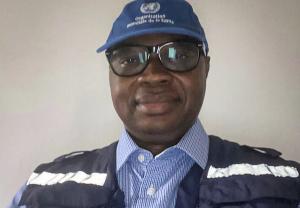Meet team WHO: Dr Gilson Paluku, Immunization Officer
A medical doctor with experience in over 15 countries in Africa and the Americas, Dr Paluku was Chief Medical Officer for North Kivu province in his native Democratic Republic of Congo (DRC) before joining the World Health Organization (WHO) back in 2001.
Since then he has been based in DRC, Ivory Coast and Mali. He has worked with the Pan-American Health Organization (PAHO) in Haiti and as an epidemiologist at the United States Centers for Disease Control and Prevention (CDC). Dr Paluku leads WHO’s work to introduce new vaccines and routine immunization in 10 Central African countries from Libreville, Gabon.
What drives your commitment to this work?
As a boy I wanted to be a journalist but that had all changed by the time I started studying medicine at University in Kinshasa. Yet unlike the other future doctors studying there, I fell in love with public health and went on to do a public health master’s degree.
WHO is the global leader in public health so I wanted to join the organization. I wanted to work with communities on preventing diseases, treatment, rehabilitation and health promotion.
In the Americas, Measles and Rubella were eliminated through immunization. I helped with this while in Haiti. The world is set to eradicate polio, and I have worked to reach this dream since 2001, including in conflict zones like the Central African Republic, Ivory Coast and DRC.
WHO helps protect tens of millions of young children from vaccine-preventable diseases through vaccination every year in Africa. I’m proud to be part of this life-saving work.
What are the main challenges for Central Africa’s rollout of COVID-19 vaccines?
Excluding the issues we’ve had around the security of supplies, there are two big challenges.
The first is a lower demand for vaccines in some communities. This is often driven by misinformation, rumours and falsehoods that spread both online and offline.
The second is lack of resources and funds for the operational aspects of each country’s national deployment and vaccination plans.
The good news is that Africa has the best experience anywhere in mass vaccination. Each year African countries implement polio, measles, yellow fever and tetanus campaigns.
In Central Africa, we’re seeing a good uptake COVID-19 vaccines in Angola, Sao Tome and Equatorial Guinea, where political and community engagement is high.
What are you most proud of?
When I started my work in Haiti in 2012 all the performance indicators around the surveillance of vaccine preventable diseases were bad. When I left three years later, Haiti had some of the best performance indicators in the Americas.
Building and leveraging strong partnerships was key to this success. This included joint costing, planning, implementing and monitoring between PAHO, the United States CDC and the Brazilian government, building on the unique strengths and resources that each partner brings.
All this was underpinned by the strong commitment shown throughout Haiti’s health system.
I received an award from the United States CDC for my surveillance and health monitoring work in Haiti, and I’m proud for WHO-Africa to receive this recognition.



